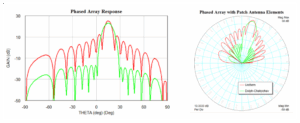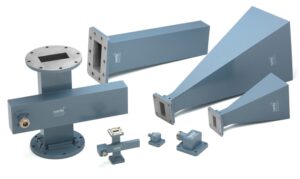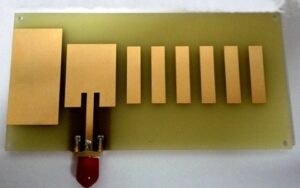The Ka-band OMT from Dolph Microwave is an Orthomode Transducer that operates within the frequency range of 17 to 31 GHz. With an isolation level of 35 dB, this OMT ensures minimal interference or leakage between its ports, providing a high level of isolation. Additionally, it boasts a return loss of 13.98 dB, indicating efficient signal reflection back into the system. These features make the Ka-band OMT an excellent choice for applications requiring reliable signal separation and minimal cross-polarization. With Dolph Microwave’s expertise, this OMT offers superior performance and reliability in various Ka-Band applications.
| Model | DH-OMT-Ext.Ka-RT-X-01 |
| Electrical Specifications | |
| Frequency Range | Rx 17.7 to 21.2 / Tx 27.5 to 31.0 GHz |
| VSWR | 1.25:1 |
| Insertion loss | Tx 0.1 dB / Rx 0.15 dB |
| Isolation | 35 dB min |
| Cross Pol. | 35 dB min |
| Power Handling | max. 500 W CW each port |
| Mechanical Specifications | |
| Waveguide type | R220 / WR42, R320 / WR28 |
| Flange 1, 2 | FBP220 (cover) / FBP320 (cover) |
| Common Port | Circular waveguide φ11.2mm, 0.441″ |
| Material | Aluminum / Conductive Oxidation |
| Finish | Black/White Paint |
| Operating Temperature | -30℃~+75℃ |
| Additional Feature | I-type rotary joint with integrated drive system are available Additional Feature for polarization control adjustment (Option) |
Question 1.
Are there any bulk pricing options available?
-Yes, there are bulk pricing options available. To view the pricing details, you will need to contact.
Question 2.
What is the ECCN (Export Control Classification Number) of the product?
-The ECCN (Export Control Classification Number) of the product is designated as EAR99.
Question 3.
What is the SKU of the product?
-The SKU of the product is “DH-OMT-Ext.Ka-RT-X-01“.
Question 4.
What are the technical details of the transducer?
What are the horizontal and vertical ports of the transducer?
-The horizontal and vertical ports of the transducer are WR-28 WG
What is the size of the antenna port?
-The size of the antenna port is 0.441″ Dia Circular WG
What is the cross polarization of the transducer?
-The cross polarization of the transducer is 35 dB.
What is the isolation of the transducer?
-The isolation of the transducer is 40 dB.
What is the insertion loss for both the antenna to V port and the antenna to H port?
-The insertion loss for both the antenna to V port and the antenna to H port is 0.5 dB.
What is the minimum and maximum frequency range of the transducer?
-The minimum frequency is 17 GHz and the maximum frequency is 31 GHz.
Question 5.
What is the cross-polarization level of the transducer?
What is the insertion loss of the transducer?
-The OMT provides a low insertion loss, indicating minimal signal strength loss as it passes through the transducer
What type of flanges are used in the OMT?
-All ports have standard UG-599/U flanges with 4-40 threaded holes.
What is the configuration of the OMT?
-The Ka-Band OMT is configured with a 0.441” diameter circular waveguide for the antenna port and two WR-28 waveguides for the horizontal and vertical ports.
What is the port isolation of the transducer?
-The OMT shows high port isolation, indicating a significant level of isolation between different ports.
Question 6.
What is the isolation level of the transducer?
Does the transducer have a low insertion loss?
-The Ka-Band OMT provides a low insertion loss.
What is the cross-polarization cancellation level of the transducer?
-The Ka-Band OMT shows high cross-polarization cancellation
What is the port isolation level of the transducer?
-The Ka-Band OMT shows high port isolation.







